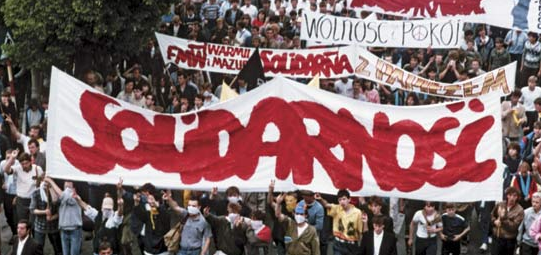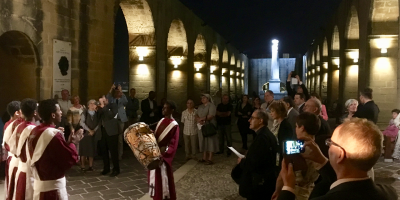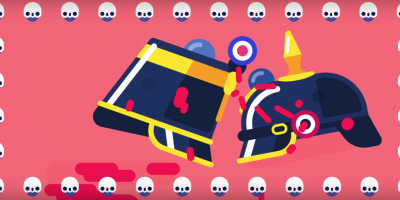Exactly 36 years after my first visit to Warsaw on May Day, 1981, I find myself back in the Polish capital addressing an audience too young to remember those heady days–when Lech Walesa and his Solidarity trade union dared to challenge the communist system.
The euphoric Polish students I addressed back then seemed unimpressed by the threat of a Soviet occupation: “We’ll just turn the signposts around,” they had joked when asked what they would do if Russian tanks rolled in, as in Budapest and Prague.
While speaking to the students, I had experienced an on-the-spot revelation about God’s hand in history. I had read them Daniel’s interpretation of Nebuchadnezzar’s dream: A small stone smashed the whole statue, and then grew to become a huge mountain that filled the whole earth (Daniel 2: 35).
After describing how the Babylonian, Persian, Greek and Roman empires had all been ‘smashed’, and that the Third Reich designed to last a thousand years had also been smashed, I had been horrified to hear myself blurt out (in an open meeting in a communist country): “…and the communist empire will too be smashed!”
What on earth was I saying? I thought to myself. Suddenly I realised that, up to that moment, I had believed that communism was here for ever and ever, amen! But, now I understood there was only one unshakeable kingdom: God’s Kingdom, starting small like the stone that became a huge mountain that filled the earth.
From then on I had had a different expectation of the future. Eventually, the Berlin Wall fell and communism collapsed. A spiritual revolution had been underway since John Paul II’s visit to that city in 1979, when he had exhorted an audience of one million Poles: ‘Fear not!’ About the same time, Vaclav Havel was urging his fellow Czechs not to live under the lie. All of which had led to the great historic changes of 1989.
Sensation
Yet there was an earlier event without which all the above might never have happened. It took place on May 9, 1950 in Paris, when, in the space of a mere three minutes, Robert Schuman launched the European project in Paris.
In less time than it takes to boil an egg, the French Foreign Minister that evening laid the foundations for the European House in which today half a billion Europeans from 28 (soon 27) nations live together in peace. Faster than one can make a cup of coffee, Schuman addressed five major themes which continue to be at the heart of the European project: world peace, unity in Europe, the sharing of sovereignty, solidarity within Europe and with the wider world.
The next day, May 10, newspapers wrote of the ‘Schuman bomb’, announcing: ‘Eine sensation aus Frankreich!’, ‘France takes the nations by surprise’. It was indeed sensational and unprecedented in history; the defeated nation was to partner on equal terms with the victor. Forgiveness and reconciliation were to be the foundation for a new era of interdependency.
Schuman wrote that ‘loving your neighbour as yourself’ was a democratic principle which, applied to nations, meant being prepared to serve and love neighbouring peoples. The universal law of love and charity made every man our neighbour.
For 67 years now, a growing number of European member states has sought unity and interdependence. Yet something has been missing. Schuman warned that the project needed a soul. Jacques Delors, when resigning as president of the EU Commission in 1992, cautioned that without a soul the game would be over—adding that by ‘soul’ he meant ‘spirituality and meaning’.
Game over?
That game could be over very soon. Next Sunday, May 7, French voters could well bring the project to shuddering halt if they choose Marine Le Pen as their next president. Pollsters say this is unlikely, but after Brexit and Trump, anything is possible.
While a Brexit is damaging, a Frexit would be fatal. French-German reconciliation has been the keystone of the European project. Without it the whole edifice will totter.
Have we expected too much from politicians to give Europe a soul? Surely that is the task of the people of God, who are to be salt and light! As the Polish workers and students realised, the future of Europe is too important to leave to politicians. Civil society and faith communities everywhere should be engaged re-imagining a Europe of hope, healing and hospitality.
That is the goal of the State of Europe Forum in Valletta this coming Sunday and Monday. And also of an ecumenical symposium on May 9 in the Dom Church in Utrecht (More than market and euro), partly fruit of last year’s State of Europe Forum in Amsterdam. Why shouldn’t believers all over Europe be initiating annual events on Europe Day engaging together about the kind of Europe we want?
After all, it’s our Europe. It’s our future. It’s our responsibility.
Till next week,



